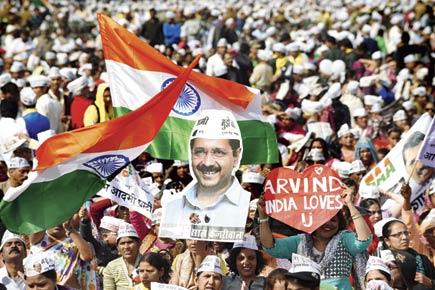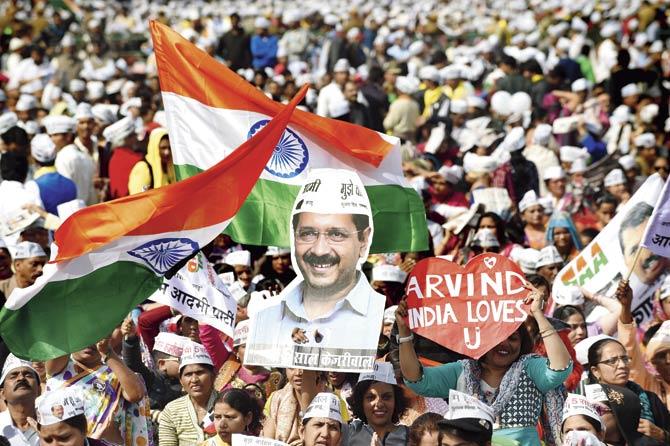The Aam Aadmi Party government in New Delhi has asked the people for help as it has run out of money

 The Aam Aadmi Party government in New Delhi has asked the people for help as it has run out of money. On the off chance that you’ve been living in the Andromeda Galaxy for the past few years, the Aam Aadmi Party was born out of the India Against Corruption movement. The idea then was to rid India of corruption and getting a people’s judge to look at cases against politicians and bureaucrats. The AAP won Delhi by a massive mandate this year 67 out of 70 seats but between 2011 and today, this people’s judge idea has not really taken off. Not even in Delhi.
The Aam Aadmi Party government in New Delhi has asked the people for help as it has run out of money. On the off chance that you’ve been living in the Andromeda Galaxy for the past few years, the Aam Aadmi Party was born out of the India Against Corruption movement. The idea then was to rid India of corruption and getting a people’s judge to look at cases against politicians and bureaucrats. The AAP won Delhi by a massive mandate this year 67 out of 70 seats but between 2011 and today, this people’s judge idea has not really taken off. Not even in Delhi.

Supporters of the Aam Aadmi Party (AAP) cheer as party convenor Arvind Kejriwal is sworn in as chief minister in New Delhi on February 14, 2015. The AAP won Delhi by a massive mandate this year — 67 out of 70 seats but between 2011 and today, the people’s judge idea has not really taken off. Not even in Delhi. Pic/AFP
ADVERTISEMENT
The BJP came to power at the Centre also with a huge mandate from the electorate. One of the burning issues which led to its victory was the corruption charges against the previous Congress-led UPA government. But the bets are off on whether India has become corruption-free or anywhere near inching towards that since then. For those who were not in deep space, the scams of the UPA broke after the alliance won its second term. The 2G spectrum scam touched not just politicians but also corporates and the media.
But political or bureaucratic corruption is an easy target. The image of a slimy, sleazy, oily politician licking his fingers at the prospect of suitcases full of cash being home-delivered is burned into our psyche through popular culture and popular belief. The venal government officer, from the clerk in the transport department to an engineer in public works to the smooth senior civil servant — how we love to see them fall. A doctor I met recently wanted to help a state government set up cancer units in government hospitals. He was stonewalled until he understood from the hints thrown at him that the bureaucracy would take it further only if there was money to be made. The gossip, tragically, is often true.
But the Supreme Court verdict in the IPL case proves how corruption is not limited to these worthies we so love to hate. Sportspersons, industrialists, administrators all seemed to have had their hands in one till or the other. Is tax evasion a form of corruption? Hiding ownership of a company? Betting? Slipping a cop R100 when he’s about to write you a ticket for breaking a red light? Paying donation to a school to get admission for your kid? Jumping the queue — which, by the way, is close to a certified national affliction, best exemplified at airports where people shamelessly pretend that they cannot see anyone standing in front of them.
It is true that there is extreme hypocrisy in banning betting in India when you allow it for horse racing, you have lotteries and indeed, you have a stock market. Betting and gambling are part of being human. No imposed nanny-morality can, for example, stop two children from betting with each other over who can run faster or skip stones further. Legalising betting in sport might at least bring the hidden out into the open and weed out some of the rot. It’s not like it being illegal stops anyone from gambling or betting. All those Diwali card parties...
The problems with the Indian Premier League though, go beyond betting and match-fixing, and even beyond cricket. They point to how far we’re willing to forgive people for crossing all sorts of lines, while pretending that we care about corruption. Except for a blip in 2000, when the Delhi police exposed Mohammed Azharuddin and Hansie Cronje amongst others, the national interest in cricket has not waned. The media has gone hammer and tongs at N Srinivasan and India Cements, but Chennai Super Kings has remained a top IPL team for fans. It all depends on how you look at things that matter to you and how much you’re willing to
forgive.
The reason we like to aim corruption charges at politicians and bureaucrats is because we like to hide the corrupt activities we’re closer to. This gives us an unassailable moral high ground and our complicity hides the rest.
As for the AAP request, make of it what you will. At least they asked.
Ranjona Banerji is a senior journalist. You can follow her on Twitter @ranjona
 Subscribe today by clicking the link and stay updated with the latest news!" Click here!
Subscribe today by clicking the link and stay updated with the latest news!" Click here!







